
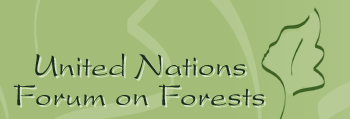 |
Fourth Session
of the United Nations Forum on Forests
Geneva,
Switzerland, 3- 14 May 2004
|
 |
| Earth
Negotiations Bulletin
- ENB |
|
|
|
UNFF-4 HIGHLIGHTS
Thursday, 13 May
On
Thursday, delegates met in parallel working groups to continue negotiating
Vice-Chair's text on forest-related scientific knowledge (FRSK),
traditional forest-related knowledge (TRFK), monitoring, assessment
and reporting (MAR) and criteria and indicators (C&I), and the
process for facilitating the review of the effectiveness of the
international arrangement on forests (REIAF). At various times in
the day, delegates also convened informal-informal negotiations
on the social and cultural aspects of forests (SCAF), among other
topics.
|
|
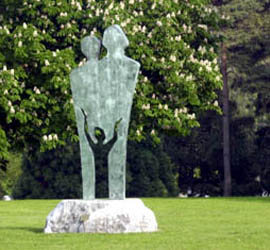
"La Famille" Statue at the Palais des Nations. |
WORKING GROUPS:
|
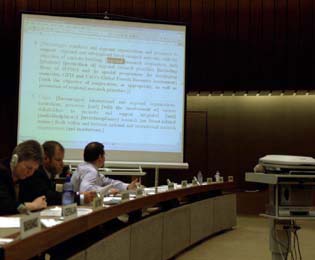
Participants
to Working Group 1 refined the Vice-Chair's Text during the morning
session.
|
|
Working
Group 1: Forest-related Scientific Knowledge (FRSK)
Delegates
agreed to open the relevant paragraphs on lessons learned with
"in spite of lessons learned, experience has shown that."
Noting the decline of public funding for research in both developed
and developing countries, delegates agreed to state that this
limited the potential contribution of forest research to the advancement
of the Intergovernmental Panel on Forests/Intergovernmental Forum
on Forests (IPF/IFF) proposals for action. |
|
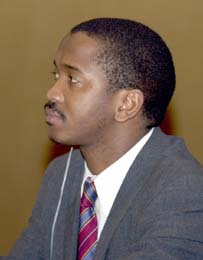
Working Group 1 Chair Xolisa Mabhongo.
|
| 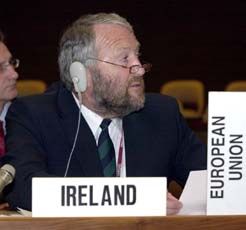
Delegates
agreed to modify the EU proposal on strengthening linkages between
science and policy.
|
|
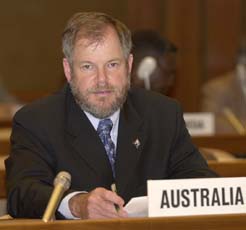
Tony
Bartlett, Australia, asked to restructure the lessons learned part
of the text.
|
|
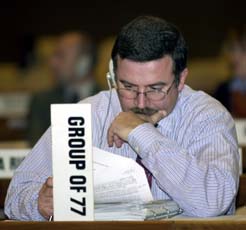
On lessons learned, the G77/China noted that some were not formulated
in terms of past experiences, but future actions.
|
|
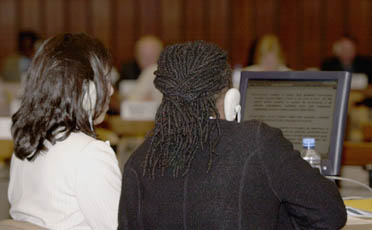
Members
of the Secretariat updating the draft text.
|
|

Safiya
Samman and John Parrotta, US, agreed to delete a reference to broader
development goals.
|
|
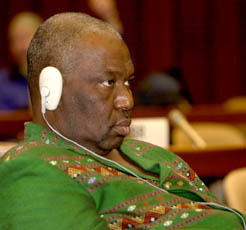
Delegate
from Senegal taking in the negotiations.
|
|
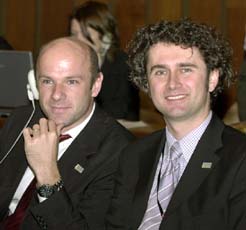
Alexander
Buck and Peter Mayer of IUFRO brightening up working group 1 with
their smiles.
|
|
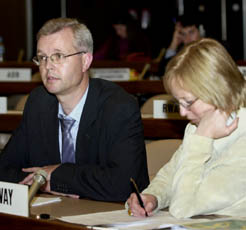
Knut
Øistad and colleage (Norway) said that not only developing
but also developed countries are experiencing decreased funding
for forest-related research. |
| 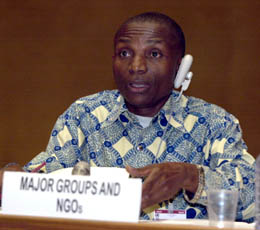
Representative
of Indigenous peoples said its input was of utmost importance
and welcomed "collaboration with indigenous peoples."
|
|
Traditional
Forest-related Knowledge (TFRK):
In the afternoon
Chair Xolisa Mabhongo (South Africa) reopened
discussions on the revised Vice-Chair's Text on TFRK.
The G-77 proposed a single operative paragraph but expressed willingness
to negotiate the initial text.
|
|
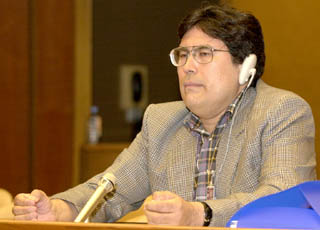
Ronald Barnes, Indigenous World Association, questioned the minimal
involvement of indigenous peoples at this stage of the debate and
said their input must be taken into account throughout the text.
|
| 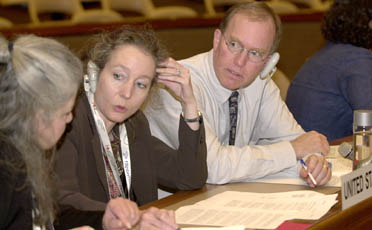
The
US said its concerns were access to TFRK and recognition that
TFRK adds to SFM and poverty reduction.
|
|
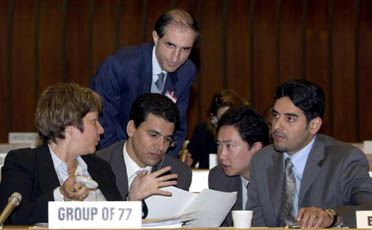
G77/China
explained its concerns over facilitation of access, use of mainstream
intellectual property instruments and prejudicing the work of other
fora. |
| 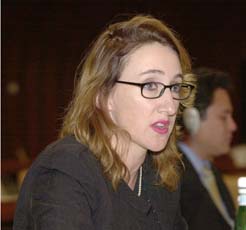
Janice
Coombs, New Zealand, suggested to delete both "traditional"
and "original" TFRK holders, noting the difficulty identifying
a traditional holder.
|
|

Teresa
Moreira (above left) and Mitzi
Valente da Costa
(above, right)Brazil,
on behalf of the G77/China, asked that a paragraph on the CPF supporting
national actions refer to "traditional" holders of the
knowledge and to the "preservation" and protection of
TFRK.
|
| 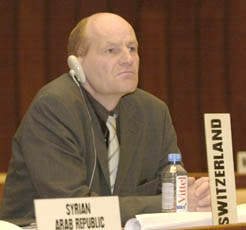
Christian
Küchli, Switzerland.
|
|
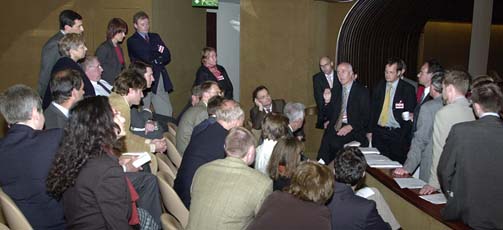
Before
working group 2 convened in the afternoon, some delegates held an
informal meeting in the plenary hall, led by Australian Mike Macnamara.
|
| Working
Group 2:
Monitoring, Assessment and Reporting (MAR) and Criteria and Indicators
(C&I)
Working
Group II continued discussions on a Vice-Chair's draft text on MAR
and C&I. In the preamble and lessons learned proposed by the
Vice-Chair, the EU suggested referring to MAR and C&I in separate
paragraphs. On using C&I for MAR progress to sustainable forest
management (SFM), the US, with the G-77/CHINA, proposed adding reference
to IPF/IFF proposals for action. The preamble was then accepted.
Delegates adopted a paragraph encouraging states to invite stakeholder
participation in C&I development and implementation.
|
|
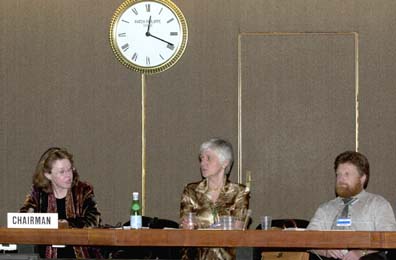
AM
Working Group 2 Chair Stephanie Caswell announces that the meeting
(scheduled to start at 10 am) will start at 12:30pm. |
|
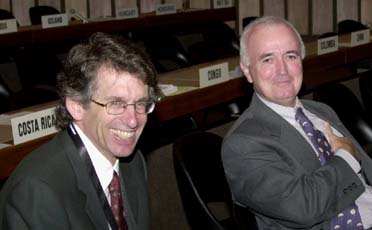
Mark
Fullerton (Canada) and Mike Macnamara (Australia) biding time before
the delayed start of the session.
|
|
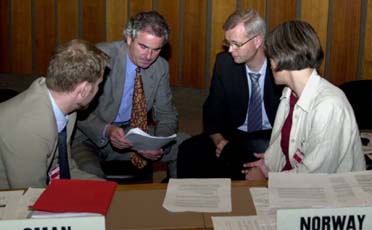
Ingwald
Gschwandtl (Austria) and Knut Øistad (Norway) with colleagues,
taking advantage of the time to review some documents. |
| Review
Process:
Working Group II continued discussions on a revised Vice-Chair's
draft text on REIAF. Delegates agreed to invite the CPF and other
relevant organizations to report on implementation of the IPF/IFF
proposals for action and on the 21 Specific Criteria, and to voluntarily
provide quantifiable benchmarks against the criteria "within
their mandate." Delegates also discussed a possible deadline
for the Secretariat to prepare and distribute a report in advance
of UNFF-5, as well as the development of a questionaire.
|
|
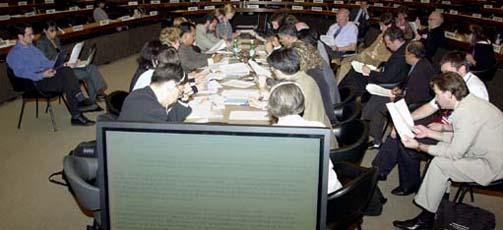
Delegates
of Working Group 2 decided to gather together in the center of the
room in effort to facilitate the negotiations text revision.
|
| 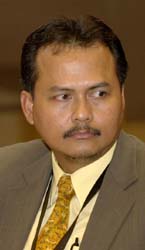
Working
Group 2 Chair Ngurah Swajaya.
|
|
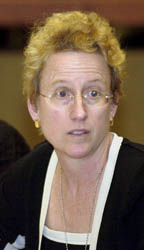
Susan
Braatz, UNFF Secretariat.
|
|
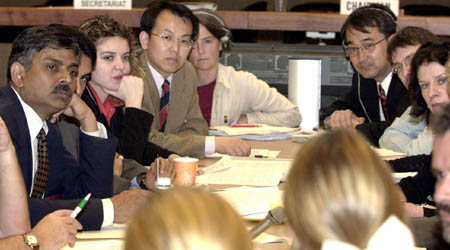
Participants
of Working Group 2.
|
| 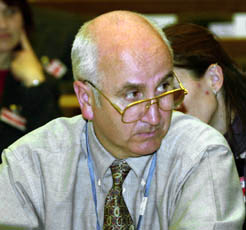
The
EU repeatedly stressed the need for a questionnaire, noting it would
raise the reporting rate and facilitate REIAF by making reports
comparable.
|
|
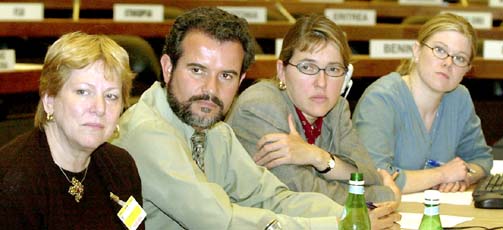
Mexico
(second from left in above photo) stressed the importance of having
translated versions of the report for consideration by member states
at least a month in advance. |
| 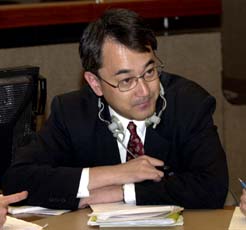
Regarding the questionaire, Japan suggested limiting the number
of questions and requesting simple information relevant only to
REIAF.
|
|
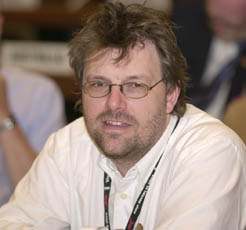
Delegate from Belgium participating in the discussions.
|
|
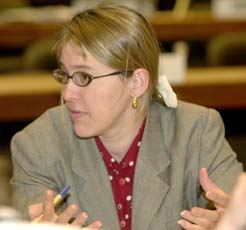
Eva
Pizano, Mexico, participating in Working Group 2 discussions.
|

Links
to more information:
- United Nations
Forum on Forests (includes UNFF4 documents and information on
previous Sessions):
http://www.un.org/esa/forests/
- ENB
coverage of the Third Session of the United Nations Forum on Forest
(UNFF-3), 26 May - 6 June 2003, Geneva, Switzerland:
http://enb.iisd.org/forestry/unff/unff3/
- SD coverage
of the Interlaken Workshop on Forestry, Switzerland, 27-10 April
2004:
http://enb.iisd.org/crs/forest/sdlak
- ENB coverage
of thePreparatory Committee for the Negotiation of a Successor
Agreement to the International Tropical Timber Agreement (ITTA),
1994 (PREPCOM II), 10-12 November 2003, Yokohama, Japan: http://enb.iisd.org/forestry/itto/prepcom2/
- ENB coverage
of the 35th Meeting of the ITTC, 3-8 November 2003, Yokohama,
Japan: http://enb.iisd.org/forestry/itto/ittc35/
- SD coverage
of the World Forestry Congress 21-28 Sept. 2003, Quebec City,
Canada: http://enb.iisd.org/crs/wfc12/
- Linkages'
Portal on Forests, Deserts and Land:
http://enb.iisd.org/process/forest_desertification_land.htm#forest%20enb
|
|
|
|

Any
irregularities on this page? Please email the Digital
Editor | Linkages
home | Visit IISDnet | Send
e-mail to ENB |
© 2004, IISD. All rights reserved.
|

